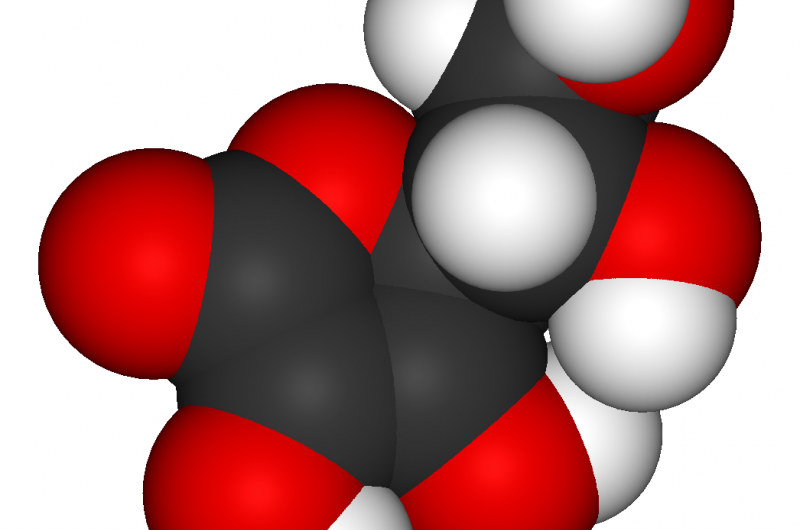Vitamin C halts growth of aggressive forms of colorectal cancer in preclinical study

High levels of vitamin C kill certain kinds of colorectal cancers in cell cultures and mice, according to a new study from Weill Cornell Medicine investigators. The findings suggest that scientists could one day harness vitamin C to develop targeted treatments.
Colorectal cancer is the third most-common cancer diagnosed in the United States, with about 93,090 new cases each year. Around half of those cases harbor mutations in the KRAS and BRAF genes; these forms of the disease are more aggressive and don't respond well to current therapies or chemotherapy.
In a study, published Nov. 5 in Science, a team of researchers from Weill Cornell Medicine, Cold Spring Harbor Laboratory, Tufts Medical Center, Harvard Medical School and The Johns Hopkins Kimmel Cancer Center found that high doses of vitamin C—roughly equivalent to the levels found in 300 oranges—impaired the growth of KRAS mutant and BRAF mutant colorectal tumors in cultured cells and mice. The findings could lead to the development of new treatments and provide critical insights into who would most benefit from them.
"Our findings provide a mechanistic rationale for exploring the therapeutic use of vitamin C to treat colorectal cancers that carry KRAS or BRAF mutations," said senior author Dr. Lewis Cantley, the Meyer Director of the Sandra and Edward Meyer Cancer Center and the Margaret and Herman Sokol Professor in Oncology Research at Weill Cornell Medicine.
The conventional wisdom is that vitamin C improves health in part because it can act as an antioxidant, preventing or delaying some types of cell damage. However, Dr. Cantley and his colleagues discovered that the opposite was true in regards to high-dose vitamin C's therapeutic effects for the KRAS and BRAF forms of colorectal cancer—they occur as a result of inducing oxidation in these cancer cells.
In an oxygen-rich environment such as human arteries, a fraction of vitamin C, also called ascorbic acid, becomes oxidized and is transformed into a new compound called dehydroascorbic acid (DHA). Scientists have known for some time that a specific membrane protein, known as glucose transporter GLUT1, enables both glucose and DHA to enter cells—an activity not afforded to ascorbic acid. But it was less clear what DHA does once inside the cells.
In the study, investigators show that DHA acts like a Trojan horse. Once inside, natural antioxidants inside the cancer cell attempt to convert the DHA back to ascorbic acid; in the process, these antioxidants are depleted and the cell dies from oxidative stress.
"While many normal cells also express GLUT1, KRAS-mutant and BRAF-mutant cancer cells typically have much higher levels since they require a high rate of glucose uptake in order to survive and grow," Dr. Cantley said. "Also, KRAS and BRAF mutant cells produce more reactive oxygen species than normal cells and therefore need more antioxidants in order to survive. This combination of characteristics makes these cancer cells far more vulnerable to DHA than normal cells or other types of cancer cells."
Although Dr. Cantley cautioned that these results need to be evaluated in the setting of a human clinical trial, the pre-clinical findings may offer a promising new treatment strategy for the KRAS or BRAF forms of the disease, perhaps as part of a combination therapy. The investigators say their study could lead to the development of new biomarkers that could help physicians determine who would most benefit from treatment. These insights may also have implications for other hard-to-treat cancers that express high levels of GLUT1 transporter, such as renal cell carcinoma, bladder cancer and pancreatic cancer.
Vitamin C has multiple effects on cellular functions in addition to its anti- or pro-oxidant functions, so it will be important to study the effects of high-dose vitamin C on normal and immune cells, said lead author Dr. Jihye Yun, a postdoctoral fellow in Dr. Cantley's lab.
"Further study is definitely needed to expand our understanding of these processes. But now that we know the mechanisms, we can utilize the knowledge wisely to get the desired effects," she said.
"This is not a therapy that you would want to wander into blindly without knowledge of what is going on in your tumor," Dr. Cantley added.
Dosing recommendations also need to be determined. Therapeutic benefit would likely require intravenous injections, as oral doses are not absorbed efficiently in the intestine to achieve the high serum concentration of vitamin C needed to cause toxicity to these cancer cells. Recent phase I clinical trials conducted on humans to test toxicity have shown that intravenous infusion of vitamin C at doses that converted to similar levels of serum as the Cantley mice trials had good safety profiles.
"Our hope is that our study will inspire the scientific community to take a fresh look at this safe and inexpensive natural molecule and stimulate both basic and clinical research regarding vitamin C as a cancer therapy," Dr. Yun said.
More information: Vitamin C selectively kills KRAS and BRAF mutant colorectal cancer cells by targeting GAPDH, Science 6 November 2015: 619. DOI: 10.1126/science.aaa5004
















